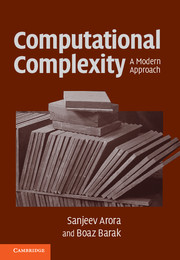Book contents
- Frontmatter
- Contents
- About this book
- Acknowledgments
- Introduction
- 0 Notational conventions
- PART ONE BASIC COMPLEXITY CLASSES
- PART TWO LOWER BOUNDS FOR CONCRETE COMPUTATIONAL MODELS
- 12 Decision trees
- 13 Communication complexity
- 14 Circuit lower bounds: Complexity theory's Waterloo
- 15 Proof complexity
- 16 Algebraic computation models
- PART THREE ADVANCED TOPICS
- Appendix: Mathematical background
- Hints and selected exercises
- Main theorems and definitions
- Bibliography
- Index
- Complexity class index
15 - Proof complexity
from PART TWO - LOWER BOUNDS FOR CONCRETE COMPUTATIONAL MODELS
Published online by Cambridge University Press: 05 June 2012
- Frontmatter
- Contents
- About this book
- Acknowledgments
- Introduction
- 0 Notational conventions
- PART ONE BASIC COMPLEXITY CLASSES
- PART TWO LOWER BOUNDS FOR CONCRETE COMPUTATIONAL MODELS
- 12 Decision trees
- 13 Communication complexity
- 14 Circuit lower bounds: Complexity theory's Waterloo
- 15 Proof complexity
- 16 Algebraic computation models
- PART THREE ADVANCED TOPICS
- Appendix: Mathematical background
- Hints and selected exercises
- Main theorems and definitions
- Bibliography
- Index
- Complexity class index
Summary
Surprisingly, the proof complexity of the pigeonhole principles essentially depends on the number of pigeons.
–Alexander Razborov, 2001In defining NP we sought to capture the phenomenon whereby if certain statements (such as “this Boolean formula is satisfiable”) are true, then there is a short certificate to this effect. Furthermore, we introduced the conjecture NP ≠ coNP according to which certain types of statements (such as “this Boolean formula is not satisfiable”) do not have short certificates in general. In this chapter we are interested in investigating this phenomenon more carefully, especially in settings where the existence of a short certificate is not obvious.
We start in Section 15.1 with some motivating examples. In Section 15.2 we formalize the notion of a proof system using a very simple example, propositional proofs. We also prove exponential lower bounds for the resolution proof system using two methods that serve as simple examples of important techniques in proof complexity. Section 15.3 surveys some other proof systems that have been studied and lower bounds known for them. Finally, Section 15.4 presents some metamathematical ruminations about whether proof complexity can shed some light on the difficulty of resolving P versus NP. There is a related, equally interesting question of finding short certificates assuming they exist, which we will mostly ignore except in the chapter notes.
Information
- Type
- Chapter
- Information
- Computational ComplexityA Modern Approach, pp. 307 - 317Publisher: Cambridge University PressPrint publication year: 2009
